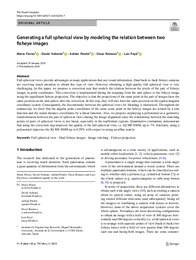Título :
Generating a full spherical view bymodeling the relation between two
fisheye images |
Autor :
Flores, María
Valiente, David
Peidró, Adrián
Reinoso, Óscar
Paya, Luis  |
Editor :
Springer |
Departamento:
Departamentos de la UMH::Ingeniería de Sistemas y Automática |
Fecha de publicación:
2024 |
URI :
https://hdl.handle.net/11000/32913 |
Resumen :
Full spherical views provide advantages in many applications that use visual information. Dual back-to-back fisheye cameras
are receiving much attention to obtain this type of view. However, obtaining a high-quality full spherical view is very
challenging. In this paper, we propose a correction step that models the relation between the pixels of the pair of fisheye
images in polar coordinates. This correction is implemented during the mapping from the unit sphere to the fisheye image
using the equidistant fisheye projection. The objective is that the projections of the same point in the pair of images have the
same position on the unit sphere after the correction. In this way, they will also have the same position on the equirectangular
coordinate system. Consequently, the discontinuity between the spherical views for blending is minimized. Throughout the
manuscript, we show that the angular polar coordinates of the same scene point in the fisheye images are related by a sine
function and the radial distance coordinates by a linear function. Also, we propose employing a polynomial as a geometric
transformation between the pair of spherical views during the image alignment since the relationship between the matching
points of pairs of spherical views is not linear, especially in the top/bottom regions. Quantitative evaluations demonstrate
that using the correction step improves the quality of the full spherical view, i.e. IQ MS-SSIM, up to 7%. Similarly, using a
polynomial improves the IQ MS-SSIM up to 6.29% with respect to using an affine matrix.
|
Palabras clave/Materias:
Full spherical view
Dual fisheye images
Image stitching
Fisheye projection |
Área de conocimiento :
CDU: Ciencias aplicadas: Ingeniería. Tecnología |
Tipo de documento :
info:eu-repo/semantics/article |
Derechos de acceso:
info:eu-repo/semantics/openAccess |
DOI :
https://doi.org/10.1007/s00371-024-03293-7 |
Publicado en:
The Visual Computer, 2024 |
Aparece en las colecciones:
Artículos - Ingeniería de Sistemas y Automática
|
 La licencia se describe como: Atribución-NonComercial-NoDerivada 4.0 Internacional.
La licencia se describe como: Atribución-NonComercial-NoDerivada 4.0 Internacional.
.png)
